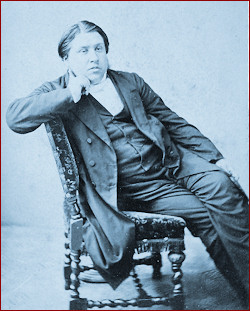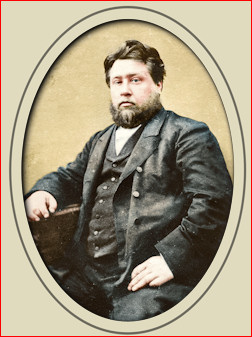by Dan Phillips
[Concluding a post begun here.]
Sharp cookies that you are, you may have noted that I am approaching this primarily from an Old Testament perspective. That is deliberate and purposeful. Refer back to the "I believe Jesus / I believe the OT" portion beginning to
the first part. I don't grant that
one self-appointed segment of Jews holds a copyright on the letters J, E and W. I think
God does. The issue is how does
He define being a
Jew-in-good-standing, in His word.
Even if one grants some role to tradition, one either accords ultimate veto-power to the Word, or he forfeits a voice.
Stay with me here, and let's ask....
Have Messiah-rejecting Jews the right to define
who is, and who is not, a Jew?
Three thought-experiments
Play a thought-experiment with me.
Put yourself in the picture in Numbers 13. You are a Jew, in Kadesh-Barnea, poised to enter Canaan. You knew Yahweh's will: He Himself had led you to this very point, and He had informed you that He was about to give you the land whose borders you were approaching. It is God's will for you to enter that land — at His word.
But then the spies bring back their report. Ten out of twelve Jewish spies reject the call to enter the land. That is, eighty-three percent of Jewish leaders say that Jews should not attempt to take Canaan. A paltry seventeen percent demur.
What is a faithful Jew, then, at that moment? Well, 83% of Jewish leadership defines a Jew as someone-who-does-not-enter-Canaan... even though Yahweh had said they should. Refusal to follow God's word defined them; not submission to it.

Read on, and you see that Yahweh's response in essence is "Fine. Don't enter. Die in the wilderness. I'll bring your children in,
along with the 17% minority of Jewish spies who trusted My word." (What percent of the total population of Jewish adults would
that be?)
So Yahweh's will for all Jews at this point is that they remain in the wilderness until all unbelieving adults had died off.
Does Israel accept God's word this time? Yet again, no. When God said "Enter," they said "We won't." Now God says "Don't enter," and they retort, "We will!"
So who is a Jew-in-good-standing now? Jews who try to take the land (as Yahweh had formerly said to do, but now said not to do)? Or Jews who stay in the wilderness (as Yahweh had formerly said not to do, but now said they should do)?
Put another way, who are the apostate Jews? Among the spies, the vast majority of Jews are apostate. Among the nation, the vast majority of Jews are apostate.
Who are the faithful Jews? The tiny minority who continues to take Yahweh at His word.
Play another thought-experiment. Without arguing about Jesus as such, imagine yourself in the days of fulfillment of Deuteronomy 18:15-19, whenever they might be. This Prophet has come. He has spoken. Some heed His words (which are the words of Yahweh); some do not.
Among that mass of Jewish population, who gets to define the Jew-in-good-standing-with-God? The number who do accept His words (which was a minority initially, in Moses' case)? Or the number who reject His words (which was a majority initially, in Moses' case)?
Who, then, are the apostate Jews? Those who accept the Prophet's words? Or those who reject them?
A third and final experiment. Consider Jeremiah's prophecy:
"Behold, the days are coming, declares the LORD, when I will make a new covenant with the house of Israel and the house of Judah, 32 not like the covenant that I made with their fathers on the day when I took them by the hand to bring them out of the land of Egypt, my covenant that they broke, though I was their husband, declares the LORD. 33 But this is the covenant that I will make with the house of Israel after those days, declares the LORD: I will put my law within them, and I will write it on their hearts. And I will be their God, and they shall be my people. 34 And no longer shall each one teach his neighbor and each his brother, saying, 'Know the LORD,' for they shall all know me, from the least of them to the greatest, declares the LORD. For I will forgive their iniquity, and I will remember their sin no more." (Jeremiah 31:31-14)
This OT prophet specifically and explicitly predicts in Yahweh's name that the Mosaic Covenant will one day be supplanted by a New Covenant.
From that, focus on just one consideration. Say that the covenant has come. Yahweh has acted to initiate this New Covenant. In so doing — according to His mouthpiece, Jeremiah — Yahweh has Himself set aside the Mosaic Covenant.
If we learn anything at all from Israel's history, we must assume that some Jews will accept this Covenant, and some will not. This has been true at every turn; there is no reason to suppose that suddenly the pattern will be broken.
That being the case then, in this experiment, riddle me this: who are the apostate Jews? The Jews who abandon the Mosaic Covenant to embrace the New? Or the Jews who adamantly stick with the Mosaic Covenant, no matter what their stated rationale?
According to the Torah, it would be the latter, not the former.
The factor that isolates and defines a Jew as a Jew-in-good-standing-with-God, in these narratives, is not whether or not he takes Canaan. It is not whether or not he stays in the wilderness. What defines a Jew-in-good-standing-with-God is whether or not He takes Yahweh at His word.
When the majority shifts, as it often did in Israelite history, that definition did not change. At some points, the remnant was very small (1 Kings 19:18). Prophecy said it would be small in the future (Isaiah 6:11-13; Zechariah 13:8). The majority per se never has the right to define faithful Judaism. God alone retains that right. It is faithfulness to God's Person and Word that defines faithful Jewishness.
Application to the question of "Jewish Christians"
Very broadly speaking, then, we have two kinds of Jews today, and only two:
- Those who affirm Jesus as Messiah
- Those who reject Jesus as Messiah
Does the latter have the right to deny the former the ability to call themselves "Jewish Christians"? If so, on what grounds? On the grounds that they are the majority? But there is no OT precedent for such a thought. In fact, the pattern of OT history is that the majority is usually apostate. The center of authority in the OT is never those who claim to be prophets, priests, or kings. The center is always the word of God.
I made a point about my blog-name and web-site name previously: Biblical Christianity. (Of course, I am far from alone in holding it as my desideratum to be faithful to the entire Canon.)
But note, I could find no blog nor any web site named "Biblical Judaism." Why? Though the Jew intent on rejecting Jesus will try to find Biblical reasons for doing so, he has nothing with God's authority to replace such faith with. How so? Well, there is no such thing as "Biblical Judaism" today. How can I say that? Simple: there is no Temple. There is no active priesthood. There are no (Mosaically-warranted) sacrifices being offered.
[UPDATE: weeks after this was posted, a friend pointed out that one does get hits searching for the phrase "Torah Judaism." If I revisit this, I'll need to surf those sites beforehand, see how they try to square that circle.]
Why not? In 70 AD, for the last time to date, Yahweh acted to dismantle the Temple utterly, and Israel became scattered to the four winds. Since that time, genealogy has been unprovable, and there has been no Levitical cultus. It's gone, finished, done-with at present.
Why? What national event had preceded this catastrophe? I have not read that Israel went into the sort of idolatry that had previously led to their expulsion from the land. What other event had occurred?
No point in being coy; you know exactly what climactic watershed event preceded 70 AD.
Messiah came, the Prophet like Moses. He spoke God's words. As usual, the majority of Jews did not listen to Yahweh's words, words that He spoke in Yahweh's name. As promised, Yahweh Himself required it of the nation.
God Himself made it impossible for them to practice Biblical Judaism. The majority continues to see this as an unfortunate tragedy perhaps, or a coincidence (since so many have a low, un-Biblical view of God — or are atheists), or as signifying something else. But if one connects it with the decisive, critical rejection of Christ, all becomes clear.
We must conclude that it is necessary to say that there are such things as apostate Jews, even as there are such things as apostate Christians.
Beginning with the second, what is an apostate Christian? It is a professed Christian who rejects some fundamental truth of the whole Bible given today. A formal professor of Christian faith who denies the truth of the Gospel, of Christ, of God — he is an apostate Christian, Biblically defined.
So who is an apostate Jew? According to the OT as we have seen it, same answer, with slight verbal adjustment: it is a Jew who rejects some fundamental truth of the whole Bible given today. Since that Bible contains the promise of Messiah, since Jesus has fulfilled and will fulfill the promise of Messiah, since the NT contains the words Yahweh gave Messiah to speak in His own person and through His prophets and apostles, the definition is provided by 66 books rather than 39.
But to stick with the OT alone, an apostate Jew is a Jew who rejected the Prophet like Moses when He came. He is one who swerved aside from the progress of revelation to create his own religion, crafted selectively on a few bones from that portion of the Word of God which was supplanted by the New Covenant, who continues in the rebellion of unbelief rather than accepted God's whole word.
And that apostate does not have the right to deny the faithful their right to speak of themselves as Jews who believe Messiah, or Messianic Jews — or, put another way, Jewish Christians.
[Note: a few related thoughts can be found
here.]


 oth ministers and private members of the church are very generally weakly in one way or other. They are living, but they are sickly. They are working for God, but they are working in a feeble, inefficient manner.
oth ministers and private members of the church are very generally weakly in one way or other. They are living, but they are sickly. They are working for God, but they are working in a feeble, inefficient manner.







 I admit that this is a recycled post from 2005, but I love this post. I loved it especially for the graphic which originally accompanied it, but somehow that picture is now lost to the internet. It's a fact for which all of you should weep.
I admit that this is a recycled post from 2005, but I love this post. I loved it especially for the graphic which originally accompanied it, but somehow that picture is now lost to the internet. It's a fact for which all of you should weep.







 religion which is all excitement, and has little instruction in it, may serve for transient use; but for permanent life-purposes there must be a knowledge of those great doctrines which are fundamental to the gospel system.
religion which is all excitement, and has little instruction in it, may serve for transient use; but for permanent life-purposes there must be a knowledge of those great doctrines which are fundamental to the gospel system.
 he gospel's most dangerous earthly adversaries are not raving atheists who stand outside the door shouting threats and insults. They are church leaders who cultivate a gentle, friendly, pious demeanor but hack away at the foundations of faith under the guise of keeping in step with a changing world.
he gospel's most dangerous earthly adversaries are not raving atheists who stand outside the door shouting threats and insults. They are church leaders who cultivate a gentle, friendly, pious demeanor but hack away at the foundations of faith under the guise of keeping in step with a changing world. Theological liberalism is particularly dependent on the stealth offensive. A spiritually healthy church is simply not susceptible to the arrogant skepticism that underlies a liberal's rejection of biblical authority. A church that is sound in the faith won't abandon the gospel in order to embrace humanist values. Liberalism must therefore take root covertly and gain strength and influence gradually. The success or failure of the whole liberal agenda hinges on a patient public-relations campaign.
Theological liberalism is particularly dependent on the stealth offensive. A spiritually healthy church is simply not susceptible to the arrogant skepticism that underlies a liberal's rejection of biblical authority. A church that is sound in the faith won't abandon the gospel in order to embrace humanist values. Liberalism must therefore take root covertly and gain strength and influence gradually. The success or failure of the whole liberal agenda hinges on a patient public-relations campaign.







 hristianity Today has posted
hristianity Today has posted 
 Now: let's bear in mind that statement comes from an Anglican bishop who is currently in communion with
Now: let's bear in mind that statement comes from an Anglican bishop who is currently in communion with 
 know of no surer way of a people's perishing than by being led by one who does not speak out straight, and honestly denounce evil. If the minister halts between two opinions, do you wonder that the congregation is undecided? If the preacher trims and twists to please all parties, can you expect his people to be honest? If I wink at your inconsistencies will you not soon be hardened in them?
know of no surer way of a people's perishing than by being led by one who does not speak out straight, and honestly denounce evil. If the minister halts between two opinions, do you wonder that the congregation is undecided? If the preacher trims and twists to please all parties, can you expect his people to be honest? If I wink at your inconsistencies will you not soon be hardened in them?

 y trek from Arminianism to Calvinism took more than ten years. Every time one of my arguments against Calvinist doctrines would fall, I would be forced to embrace some doctrine that I had heretofore been desperately trying to argue against.
y trek from Arminianism to Calvinism took more than ten years. Every time one of my arguments against Calvinist doctrines would fall, I would be forced to embrace some doctrine that I had heretofore been desperately trying to argue against. There's more. If you are an authentic Christian, you know in your heart of hearts that you weren't born again because you were morally superior to your unbelieving neighbors. You were worthy of God's wrath just like them (Ephesians 2:1-3). According to Ephesians 2:4-6, it was God who quickened you and showed you a special mercy—and that is why you are a believer. You already know that in your heart. You don't really believe you summoned faith and came to Christ in your own power and by your own unaided free will. You don't actually believe you are morally superior to unbelievers. You therefore must see, somewhere in your soul, that God has given you special grace that He has not shown everyone.
There's more. If you are an authentic Christian, you know in your heart of hearts that you weren't born again because you were morally superior to your unbelieving neighbors. You were worthy of God's wrath just like them (Ephesians 2:1-3). According to Ephesians 2:4-6, it was God who quickened you and showed you a special mercy—and that is why you are a believer. You already know that in your heart. You don't really believe you summoned faith and came to Christ in your own power and by your own unaided free will. You don't actually believe you are morally superior to unbelievers. You therefore must see, somewhere in your soul, that God has given you special grace that He has not shown everyone.












